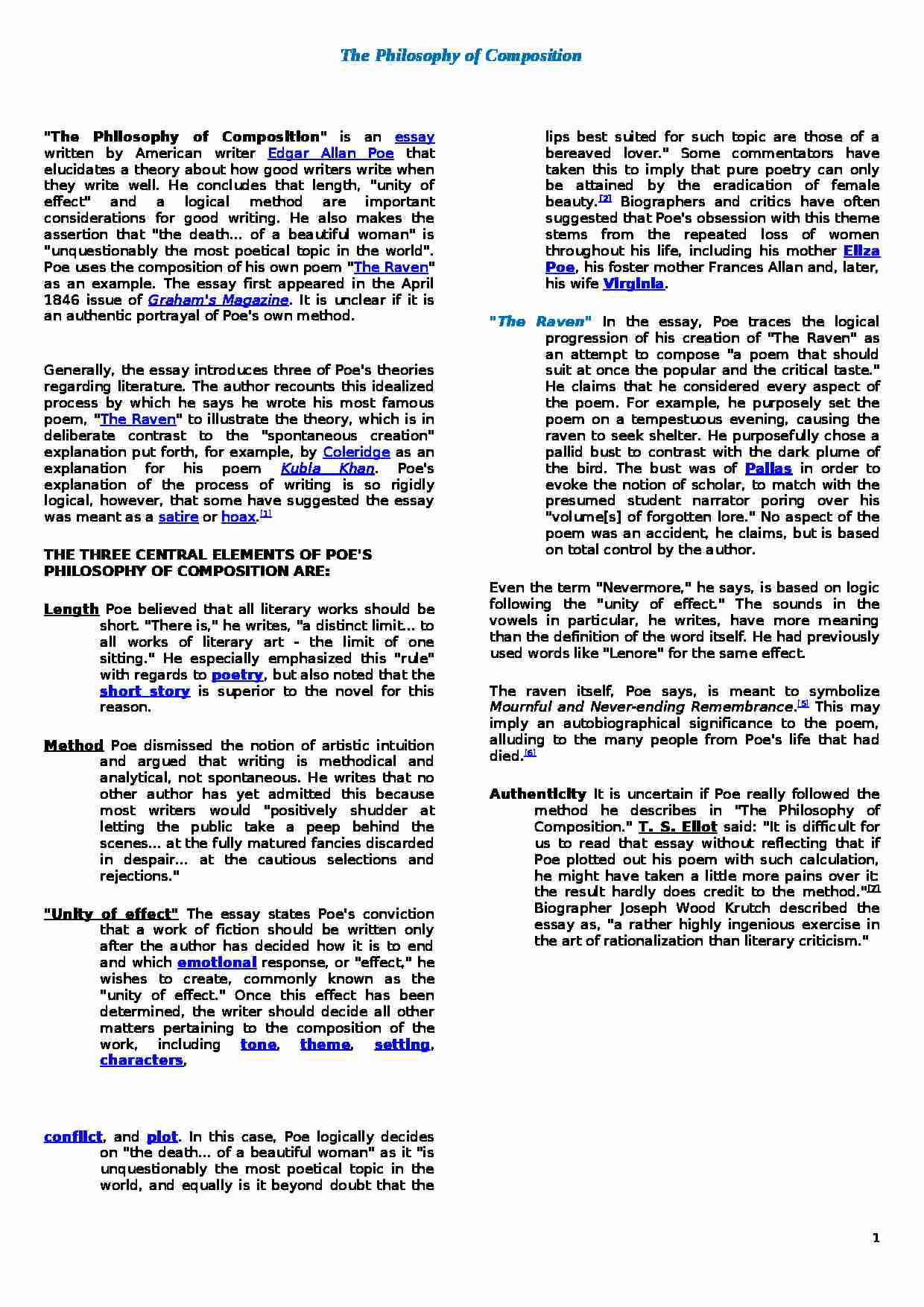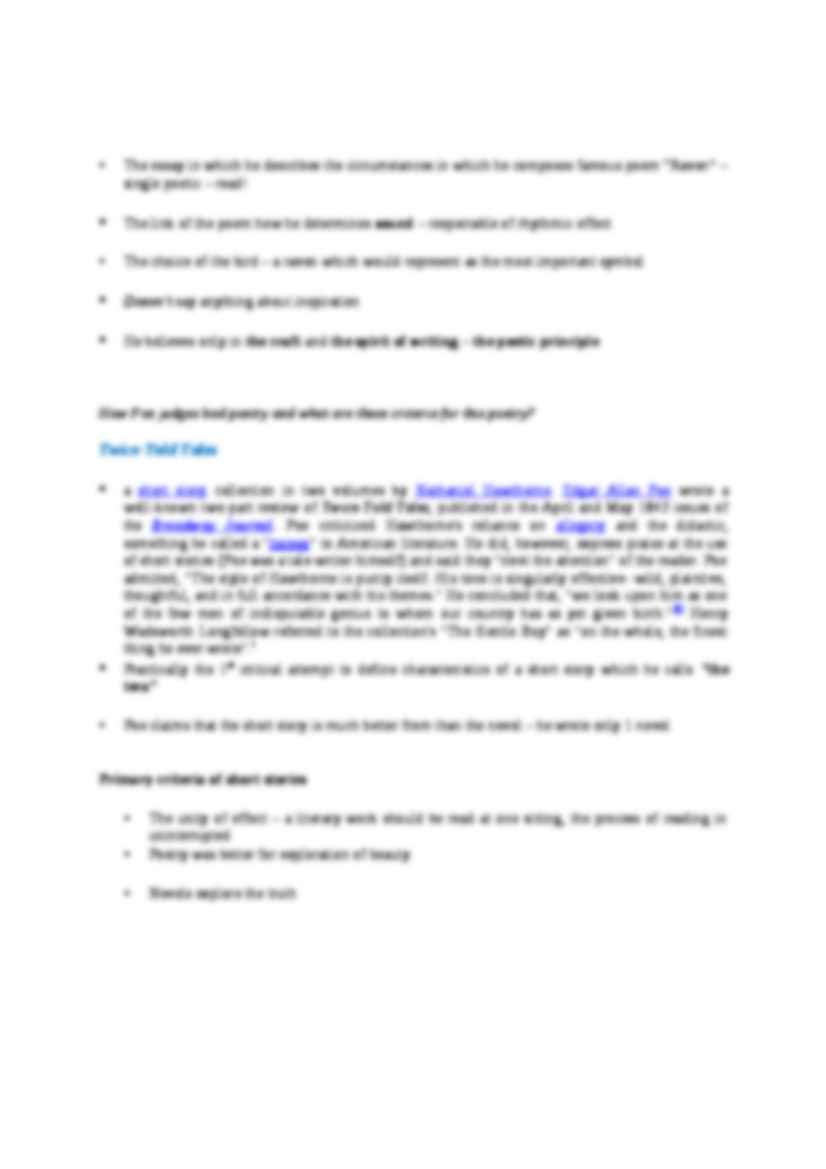To tylko jedna z 2 stron tej notatki. Zaloguj się aby zobaczyć ten dokument.
Zobacz
całą notatkę


The Philosophy of Composition
"The Philosophy of Composition" is an essay written by American writer Edgar Allan Poe that elucidates a theory about how good writers write when they write well. He concludes that length, "unity of effect" and a logical method are important considerations for good writing. He also makes the assertion that "the death... of a beautiful woman" is "unquestionably the most poetical topic in the world". Poe uses the composition of his own poem "The Raven" as an example. The essay first appeared in the April 1846 issue of Graham's Magazine. It is unclear if it is an authentic portrayal of Poe's own method.
Generally, the essay introduces three of Poe's theories regarding literature. The author recounts this idealized process by which he says he wrote his most famous poem, "The Raven" to illustrate the theory, which is in deliberate contrast to the "spontaneous creation" explanation put forth, for example, by Coleridge as an explanation for his poem Kubla Khan. Poe's explanation of the process of writing is so rigidly logical, however, that some have suggested the essay was meant as a satire or hoax.[1]
The three central elements of Poe's philosophy of composition are:
Length Poe believed that all literary works should be short. "There is," he writes, "a distinct limit... to all works of literary art - the limit of one sitting." He especially emphasized this "rule" with regards to poetry, but also noted that the short story is superior to the novel for this reason.
Method Poe dismissed the notion of artistic intuition and argued that writing is methodical and analytical, not spontaneous. He writes that no other author has yet admitted this because most writers would "positively shudder at letting the public take a peep behind the scenes... at the fully matured fancies discarded in despair... at the cautious selections and rejections."
"Unity of effect" The essay states Poe's conviction that a work of fiction should be written only after the author has decided how it is to end and which emotional response, or "effect," he wishes to create, commonly known as the "unity of effect." Once this effect has been determined, the writer should decide all other matters pertaining to the composition of the work, including tone, theme, setting, characters, conflict, and plot. In this case, Poe logically decides on "the death... of a beautiful woman" as it "is unquestionably the most poetical topic in the world, and equally is it beyond doubt that the lips best suited for such topic are those of a bereaved lover." Some commentators have taken this to imply that pure poetry can only be attained by the eradication of female beauty.[2] Biographers and critics have often suggested that Poe's obsession with this theme stems from the repeated loss of women throughout his life, including his mother
(…)
… accordance with his themes." He concluded that, "we look upon him as one of the few men of indisputable genius to whom our country has as yet given birth."[6] Henry Wadsworth Longfellow referred to the collection's "The Gentle Boy" as "on the whole, the finest thing he ever wrote".\ Practically the 1st critical attempt to define characteristics of a short story which he calls “the tera”
Poe claims that the…
…
Doesn't say anything about inspiration
He believes only in the craft and the spirit of writing - the poetic principle
How Poe judges bad poetry and what are these criteria for this poetry?
Twice-Told Tales
a short story collection in two volumes by Nathaniel Hawthorne. Edgar Allan Poe wrote a well-known two-part review of Twice-Told Tales, published in the April and May 1842 issues of the Broadway…
… evening, causing the raven to seek shelter. He purposefully chose a pallid bust to contrast with the dark plume of the bird. The bust was of Pallas in order to evoke the notion of scholar, to match with the presumed student narrator poring over his "volume[s] of forgotten lore." No aspect of the poem was an accident, he claims, but is based on total control by the author. Even the term "Nevermore," he…
... zobacz całą notatkę




Komentarze użytkowników (0)